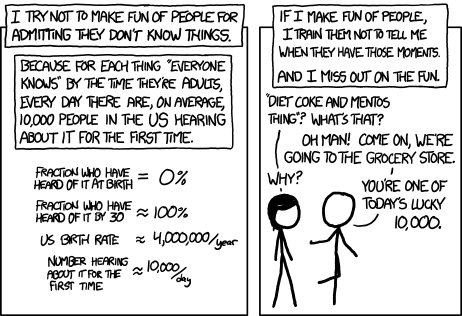I'm travelling for the holidays, so this post and next week's post will be quite short.
Last week, I wrote about enjoying the feeling of agency when noticing an ugh field (by installing a part of yourself that enjoys breaking the ugh field). Today I'll provide another example.
Anna Salamon has written about learned blankness on LessWrong:
One day, the dishwasher broke. I asked Steve Rayhawk to look at it because he's "good with mechanical things".
"The drain is clogged," he said.
"How do you know?" I asked.
He pointed at a pool of backed up water. "Because the water is backed up."
We cleared the clog and the dishwasher started working.
I felt silly, because I, too, could have reasoned that out. The water wasn't draining — therefore, perhaps the drain was clogged. Basic rationality in action.[1]
But before giving it even ten seconds' thought, I'd classified the problem as a "mechanical thing". And I'd remembered I "didn't know how mechanical things worked" (a cached thought). And then — prompted by my cached belief that there was a magical "way mechanical things work" that some knew and I didn't — I stopped trying to think at all.
Anna goes on to talk about tools for noticing learned blankness (for use if you want to reduce your learned blankness). She leaves implicit the assumption that many, upon noticing learned blankness, will want to remove it. I suggest that learned blankness is much easier to notice (and eliminate) if you first enhance your desire to eliminate learned blankness.
It's easy to imagine someone who is very good at noticing learned blankness, but sees them either as embarrassing ("oh gosh I've been saying I'm bad at mechanical things this whole time, how shameful, I had better hide that fact from others by fixing this dishwasher myself") or as a burden ("damnit, now I have to fix this dishwasher myself without help, because I have to eliminate this learned blankness"). Both of these approaches are unlikely to train the subconscious to eagerly seek out learned blanks. So I propose an alternative:
Learned blanks are fun. They denote skills that you can quickly learn, subject areas where there is low-hanging fruit. Remember the 80-20 rule: a learned blankness points to a place where it's really easy to improve, where small time-investments have large payoffs. The shortest path to becoming a Renaissance (wo)man is paved with learned blanks. Things you don't know are not a source of embarassment, but a source of excitement.

This relates back to enjoying the feeling of agency: many people, by default, go through life with many learned blanks, constraining themselves to a tiny corner of what they are capable of because they "aren't a math person" or "don't understand computers" or "can't cook". When you notice these feelings, you can notice them not as constraints, but as low-hanging fruit.
Ignore myths about which skills can and can't go together (such as the "left-brain-analytic/right-brain-creative" fable). These are society-wide versions of fixed mindset; pay them no heed. Feynman was not only a physicist but an artist. Thomas Young invented both the double slit experiment (of quantum mechanics) and also tools for translating the Rosetta Stone. Follow your interests and curiosities, regardless of what you currently can or cannot do.
In order to get your subconscious to move towards learned blanks automatically, it is first necessary to enjoy discovering learned blanks. If, upon encountering learned blankness, you feel a sense of embarrassment ("I should already know this") or duty ("now I have to learn this"), then it will be much harder to notice them when you aren't explicitly looking for then. But if instead they feel fun, if they feel like secret messages that tell you where you can cheaply acquire new skills, if they feel like the secret easy path to becoming a polymath, then you may find yourself noticing many more learned blanks than you expect.